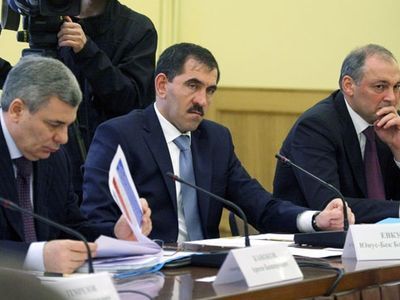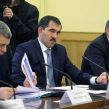
Return to Popularly Elected Regional Leaders Could Bring Sweeping Political Changes to the North Caucasus
Publication: Eurasia Daily Monitor Volume: 9 Issue: 12
By:

On January 16, in what may constitute a major political shift, Russian President Dmitry Medvedev introduced a bill reintroducing the direct election of governors in the regions of the Russian Federation. The newspaper Kommersant published photocopies of the president’s legislative proposal on its website. The legislation stipulates that parties and individuals may compete for the leadership of a region and that individuals would only need to collect a sufficient number of signatures in support of their candidacy, but that the procedure itself will have to be defined by the regions themselves. In one possible caveat, the document states that parties “willing to nominate their candidates may hold consultations with the president of the Russian Federation” and “the order of consultations is defined by the president of the Russian Federation.” While the ruling United Russia party has already agreed to have consultations with the Kremlin when nominating its candidates, opposition parties, such as the Communists and liberal Yabloko party, have stated they will not consult with the president. However, the head of the legislative department of the presidential administration, Larisa Brychova, confirmed that consultations with the president of Russia would not be required either for candidates put forward by parties or for independent contenders (https://kommersant.ru/doc/1852128, January 16).
Vladimir Putin abolished direct popular elections for regional governors in Russia in 2004, during his second presidential term, as a reaction to the hostage crisis in Beslan, North Ossetia. This move was presented as a step in building a so-called “power vertical.” Abolishing elections for regional governors was cast as strengthening the Russian state and preventing it from disintegrating like the Soviet Union. If the new legislation reversing this were to come into force and Moscow were to cede more political power to the regions of Russia, it would probably account for a change of much greater magnitude than the replacement of the country’s leadership. However, this proposal is likely only bait for the opposition in the wake of the large-scale protests against the rigged December 2011 parliamentary elections. Still, it will be harder for the Kremlin to backtrack on the legislative proposal now that it has been made public.
Ironically, as recently as September 2009, President Medvedev boldly stated at a meeting of Valdai Discussion Club: “I see no conditions under which we would retract this decision [abolishing gubernatorial elections], either now or in 100 years.” In May 2011, he was less adamant, allowing for the possibility of returning to the direct election of governors in “10-15 years’ time,” which in practice meant the same as “100 years,” given the discontinuity of Russian politics. Vladimir Putin sounded just as decisive in September 2011, when he publicly defended the system of appointing governors, saying: “[I] do not see any violation of democratic principles” (https://kommersant.ru/doc/1843733, December 22, 2011).
Both Putin and Medvedev quickly altered their opinion following the mass protests in Moscow in December 2011, after fraud in the country’s parliamentary elections was publicly exposed on a large scale. During his annual televised phone-in program on December 15, Putin stated that gubernatorial elections might be restored, but only under the supervision of the country’s president who would decide who could run for the leadership position of a given region. In the same interview, Putin disclosed that the situation in the North Caucasus had been the main driver for abolishing the direct election of governors. Referring to gubernatorial candidates in the North Caucasus, he said that they had been “unscrupulous” in their “struggle for power,” committing such sins as relying on “on nationalist groups, on separatist groups” (https://www.gazeta.ru/news/lastnews/2011/12/15/n_2135890.shtml, December 15, 2011). Whether or not Putin was telling the truth about his real motives, the fact that he used the situation in the North Caucasus to make his case is astonishing evidence of how authoritarianism in Russia proper is reinforced through its actions in the Russian quasi-colonial region of the North Caucasus. In trying to keep tight control over potential and real separatist forces in the North Caucasus, Moscow is effectively reverting to non-participatory ways of governance throughout the country. At the same time, the regimes in the North Caucasus that Moscow relies on are becoming increasingly corrupt and unpopular with the local populations.
The proposal to bring back elections for regional governors improves the chances for peace in the North Caucasus. If people in the North Caucasus are allowed to elect their own governors in free elections, it is likely to lower the tension and reduce the violence in the region, since at least some political disagreements will be resolved through the electoral process. Elections alone will probably not lead to a complete peace in the region, but reintroducing popular elections might drive other political reforms that could eventually lead to a stable peace settlement in the North Caucasus.
It is almost certain that the heads of several republics in the North Caucasus would be removed if elections were held in the region now. Under Arsen Kanokov, who was appointed as head of Kabardino-Balkaria in 2005, the republic has become a hotbed of insurgency and conflict, so it is unlikely he would survive free elections. Ingushetia has been long disappointed with its security services general-turned-president, Yunus-Bek Yevkurov, who has failed to deliver on his promises to provide security and economic development for the republic’s population. The head of North Ossetia, Taimuraz Mamsurov, would be replaced through elections for his lack of coalition building skills, economic failures and the worsening security situation in the republic. Dagestan is a complex republic, where the current relatively young and unscathed leader, Magomedsalam Magomedov, might survive elections. Because of the special situation in Chechnya, it is hard to predict how relatively free and fair elections would even be possible in this republic with Ramzan Kadyrov being removed from the republic’s political life. The leadership prospects for Rashid Temrezov and Aslan Tkhakushinov in Karachaevo-Cherkessia and Adygea, respectively, would be bleak, since both men were dubious candidates from the very beginning of their terms as a result of widespread accusations of corruption.
With political reforms possible in Russia, the North Caucasus may once again become the focal point of the country’s politics. Regardless of the results of the 2012 presidential elections in Russia, the country’s leadership will face tough choices in the North Caucasus. Retaining tight control over the region and democratizing Russia may once again prove to be incompatible tasks for the country’s politicians.




